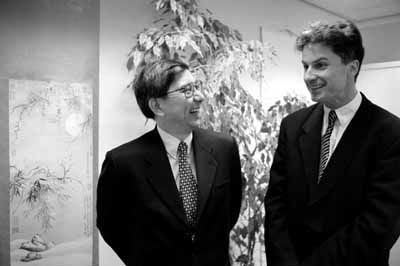Paula van de Riet
“Collaboration between the National University of Singapore and the Eindhoven University of Technology is picking up speed,” said professor Daniel Chan last week. He was in Eindhoven to attend his friend prof.dr.ir.Aarnout Brombacher’s inaugural lecture. We took the opportunity to talk to them both about the relationship between the two universities.
The NUS population is used to having Dutch staff and students around, so much so that they are called the ‘Dutch gang’ on campus. At any one time about ten TUE staff and students are physically working or studying in Singapore, and another ten Singaporeans are on the job in Eindhoven. Many others work on projects together and communicate by Internet and the occasional visit.
Collaboration between the universities originated about eight years ago with Aarnout Brombacher’s posting in Singapore for Philips. He consulted with Chan in connection with his work on quality control of TV’s. They hit it off, and now their co-operation extends to TUE, where Brombacher came to work in 1993. Brombacher spends three months of every year as a ‘Distinguished Visiting Professor’ at NUS, where he stays in “a kind of Fellowtel, but bigger and with palms”. He spends the time on research, teaching graduate students and teaching seminars. “Singapore has become my second home,” he says.
According to professor Chan Singapore and the Netherlands are natural partners. “Singapore and the Netherlands are both small countries with large ports, long trading traditions and strong high-tech sectors. The relationship between the universities in Singapore and Eindhoven is reciprocal. We are very much on equal terms. That’s why we have such a strong bond with TUE, probably from our point of view one of the strongest internationally.”
Brombacher comments: “The fact of the long-standing relationship between the universities eases other matters as well. It takes a year to prepare a working visit to a university in the USA, but you can be in Singapore in two weeks with all your papers in order and everything in place. We have set-up an infrastructure on both our campuses that encourages international collaboration.”

Professor Daniel S.H.Chan -Head Department of Electrical Engineering NUS and Prof.dr.ir.Aarnout C.Brombacher -Chairman Section Quality of Products and Processes TUE, Department of Electrical Engineering & Distinguished Visiting Professor National University of Singapore."A mutual sharing of vision".Photo: Bram Saeys
“Another thing,” Chan adds. “For good collaboration you need common values, collegiality and chemistry between people, a mutual sharing of vision or plans and complimentary areas of expertise. All that is present. For our students it is much easier to find their way in Holland than say in Germany or France, simply because everyone speaks English. Some of our people want to learn Dutch, but hardly get a chance because everyone speaks English to them. In Singapore we have four official languages, Mandarin, Malay, Tamil and English as a working language that almost everyone speaks.”
“Because we complement each other so well, we now have quite a broad based collaboration. At TUE you have a lot of experience with industrial design processes and applications; we are good at the theoretical and quantitative aspects,” he continues. “We now have joint education, joint PhDs, joint projects. Some students might not be able to travel to the other university, but increasingly this is not an obstacle. For example there is a team of mechanical engineers from Singapore and electrical engineers from Eindhoven all working on the same project. They’re talking by internet and video-conferencing when necessary. Here you have very interesting cross-cultural as well as cross-disciplinary interaction.”
Brombacher picks up the thread: “We have a Dutch student graduating in March with an oral examination by a professor in Singapore conducted through video-conference. This student was also supervised by the Singapore professor and has worked on a mechanical analysis of CD players, which should help Philips come up with some less sensitive equipment for application in diskmans and car stereos. This is a typical example of what we do.”
The collaboration is increasingly extending to more theoretical disciplines like pure mathematics and hard-core engineering. NUS are about three times the size of TUE and have more courses to offer, with, for example, a strong Law department. But co-operation hasn’t extended that far yet.
“Still,” says Chan, “the momentum is in face to face communication. A visit like mine this week is valuable for moving things forward and for introductions. Internet and video-conferencing only work when you know each other.”/.




